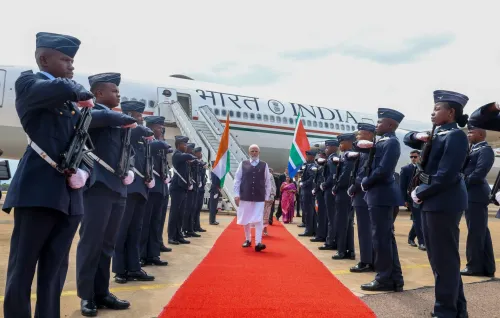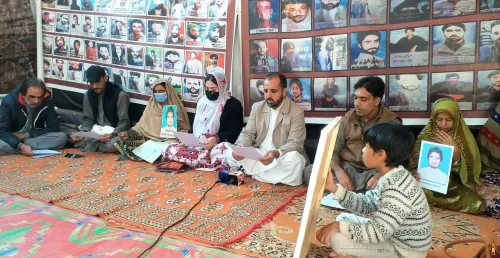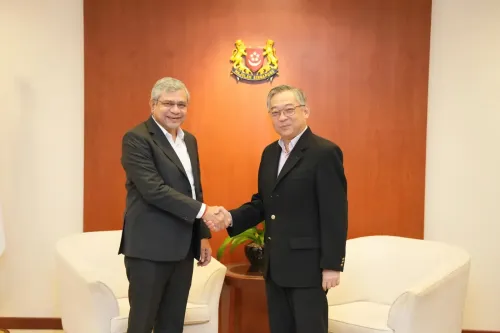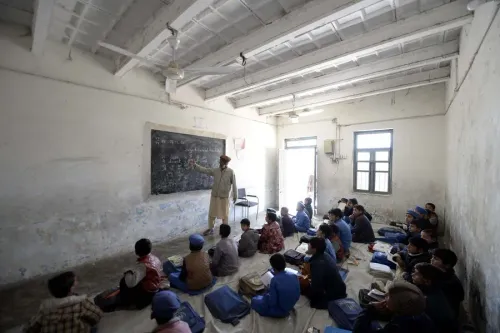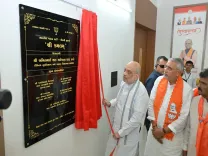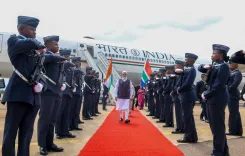What is Trump’s initiative in Gaza?
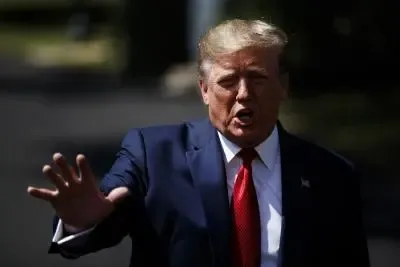
Synopsis
Key Takeaways
- Trump's initiative aims to resolve the Gaza conflict.
- It seeks a ceasefire and disarmament of Hamas.
- India's support reflects its global diplomatic stance.
- The humanitarian crisis in Gaza remains a pressing concern.
- Global reactions will shape the success of the plan.
New Delhi, Oct 5 (NationPress) US President Donald Trump, aiming to be recognized as ‘the peacemaker of the world’, has initiated an extensive strategy to address the ongoing conflict in Gaza. This comes against the backdrop of Hamas facing the full force of Israel’s offensive, which is supported by the US and several key European nations including France, Britain, as well as Canada and Australia, who endorse the recognition of a Palestinian state.
In alignment with India’s principle of advocating for peaceful resolutions to international conflicts, Prime Minister Narendra Modi quickly expressed his support for Trump’s 20-point plan aimed at resolving the Gaza crisis. He remarked that the plan offers a ‘visible pathway’ towards lasting peace for both Palestinian and Israeli communities.
Hamas has indicated a willingness to reconsider Trump’s proposal; however, Israeli Prime Minister Benjamin Netanyahu cautioned that should Hamas choose to dismiss it, ‘Israel will finish the job by itself’. Netanyahu claimed that he did not agree to the establishment of a Palestinian state during discussions with Trump in Washington, although he assured the President that Israel backs his initiative to resolve the Gaza conflict, which aligns with Israel’s military objectives. In his typical grandiloquent manner, Trump declared, ‘we have one signature that we need and that signature will pay in hell if they don’t sign’. Notably, Saudi Arabia, a US ally, has been collaborating with the UK and France to advocate for a two-state solution regarding the Palestinian issue.
The plan proposed by Trump includes establishing a ceasefire, the release of hostages by Hamas within ‘72 hours’, disarming Hamas, granting amnesty to those within Hamas who accept the notion of ‘peaceful coexistence’ with Israel, and a gradual withdrawal of Israeli forces from Gaza, which would be followed by the formation of a transitional authority led by Trump himself. This positions the US President at the forefront of implementing a potential peace agreement. Reports suggest that Qatar, which previously hosted negotiations between the US and Taliban for troop withdrawals from Afghanistan, has indicated that Hamas would evaluate the proposal earnestly.
Hamas is reportedly beginning discussions among its political and military leaders both domestically and internationally. The missile strike conducted by Israel on September 8 targeted a residential area where Hamas leadership was located, an attack that was narrowly survived by key figures of the organization. The death toll of over sixty thousand Palestinians, predominantly civilians, has sparked a humanitarian crisis in Gaza that the US cannot ignore. Amidst ongoing Israeli air strikes, the Palestinian Authority has welcomed Trump’s ‘sincere and determined efforts’. With significant Arab and Muslim nations backing Trump’s peace initiative, Hamas faces intensified pressure, especially following its organized assault on Israel on October 7, 2023, which provoked a retaliatory response from the Israel Defense Forces (IDF).
In a separate context, Trump reiterated his claim of having resolved the ‘very big’ conflict between nuclear-armed India and Pakistan. He made these statements during an address to military leaders from around the globe at a Pentagon event in Quantico, Virginia. His remarks aimed to counter skepticism within US Army ranks concerning the deployment of Defense forces for immigration enforcement. Trump boasted about having resolved numerous conflicts since his presidency began in January, stating that it would be an ‘insult’ to the US if he were not awarded the Nobel Peace Prize, adding sarcastically that ‘they might give it to some guy who didn’t do a damn thing’.
It’s noteworthy that Trump specifically mentioned Pakistan President Shahbaz Sharif and Field Marshal Asif Munir, the Chief of the Pakistan Army, among the world leaders who fully support his Gaza plan. Sharif, who attended the 80th session of the UN General Assembly in New York, met with Trump and Munir at the White House, where they publicly recommended Trump for the Nobel Peace Prize for brokering a ceasefire between India and Pakistan following a military confrontation triggered by a terror attack in Pahalgam.
Trump has already garnered backing from Israel regarding the Nobel Prize issue. He presented his case for the Nobel Peace Prize during the UN forum on September 25. His efforts to mediate peace in the Russia-Ukraine conflict, however, have not achieved the desired results due to President Zelensky’s firm stance on territorial matters. Despite his close relationship with President Putin, Trump had hoped for a more accommodating approach from Ukraine. Nonetheless, he is confident that his accomplishments justify a Nobel Peace Prize.
India’s supportive response to Trump’s initiative for peace in Gaza reflects the significance this country places on its relationships with the US, Israel, and Arab nations in the Middle East, as well as its commitment to global peace and humanitarian efforts. India has maintained its strategic autonomy, opting not to be hampered by Trump’s unpredictable policy directives regarding tariffs, visas, and immigration while fostering bilateral friendships for mutual security and economic interests. This approach emphasizes self-sufficiency in economic, security, and defense matters, alongside a strategy of patience in navigating complex international relations.
Trump has stated that if Hamas does not conform, Israel will receive full US support in ‘cleaning up’ Gaza swiftly. He envisions transforming Gaza into a commercial hub, attracting tourists, and his proposal for a transitional authority led by himself appears aimed at fulfilling this vision. Trump has shown interest in Pakistan for trade reasons, which has led him to ‘hyphenate’ India and Pakistan regarding Kashmir issues. India has firmly communicated to Trump that no ‘third party’ intervention is necessary and that it has already established the conditions for any discussions with Pakistan. Given Trump's unpredictable rhetoric, India must delineate clear boundaries that protect its national interests.
The ongoing Israeli military campaign has devastated much of Gaza, resulting in the deaths of over sixty thousand Palestinians, primarily civilians, and has led to widespread hunger, a scenario that is unacceptable to the global community. Although the Hamas attack on October 7 resulted in the deaths of over 1200 Israelis and the abduction of 250 individuals, including women and children, was utterly indefensible, India was one of the first nations to condemn the assault outright. It underscored the ‘existential’ threat to Israel, which remains acutely aware of its precarious position surrounded by hostile territories. However, the extensive destruction in Gaza has also drawn criticism, especially given that Hamas's use of underground bunkers has made collateral damage in Israel's counteractions unavoidable.
Hamas’s close ties with fundamentalist Iran have further heightened Israel's security concerns during the ongoing military conflict between Iran and Israel. The two-state solution for Palestine must ensure that Israel receives genuine guarantees for peaceful coexistence with its neighbors. It may be beneficial to have multiple Palestinian representatives, station a peacekeeping force in Gaza, and encourage Arab nations to pursue democratic reforms. Preventing a ‘clash of civilizations’ in the volatile Middle East is paramount, and the Gaza peace initiative must address these long-term issues as well.
(The writer is a former Director of the Intelligence Bureau)

